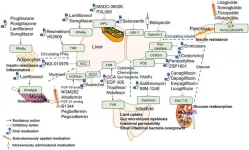(Press-News.org) DALLAS, Sept. 25, 2024 — The American Heart Association, celebrating 100 years of lifesaving service as the world’s leading nonprofit organization focused on heart and brain health for all, is joining with other top cardiovascular research funders around the world to support an international scientific research grant focused on women’s cardiovascular health. Scientific researchers around the world are invited to apply for the award to foster global advancements in understanding and improving the diagnosis, treatment and prevention of cardiovascular disease (CVD) among women.
A 2022 presidential advisory from the American Heart Association reported that women continue to be underrepresented in research for cardiovascular disease (CVD), leading to gaps in knowledge and understanding of how CVD impacts women. The advisory emphasizes that some risk factors for heart disease are specific to women or carry a different risk for CVD events in women than in men, often in relation to the way life stages affect cardiovascular health.
The grant will be awarded by the Global Cardiovascular Research Funders Forum (GCRFF) – an international alliance of 12 major funders of cardiovascular research across the world.
The International Research Challenge on Women’s Cardiovascular Health will fund one world-class international research program with up to $10 million over five years, to study and identify solutions to unmet clinical needs within women’s cardiovascular health, including:
Risk factors and prevention of cardiovascular disease across women’s life stages;
Clinical diagnosis and treatment of conditions more prevalent, or with worse outcomes among women; and
Sex-specific underlying mechanisms of cardiovascular disease in women.
“The American Heart Association is a leader in accelerating cardiovascular research and education, and in particular, bringing light to the unique challenges cardiovascular disease presents to women,” said Mariell Jessup, M.D., FAHA, chief science and medical officer of the American Heart Association and a board member of the GCRFF. “We are pleased to be joined by other like-minded organizations in making this commitment to address the significant gaps that remain in research, diagnosis and care for women everywhere as part of our mission to ensure equitable health to all people.”
This first-of-its-kind research funding opportunity will support a multi-institutional, multi-disciplinary research network to bring together experts from around the world. The chosen research team will work collaboratively to deliver impacts in women’s cardiovascular health that no single continent, country or institution could achieve on its own.
“Involvement in the GCRFF adds to our array of support for women’s health research and amplifies the potential impact because of its multi-country, multi-discipline and multi-institutional emphasis,” said Gina Wei, M.D., M.P.H., senior scientific advisor on women’s health, associate director of the division of cardiovascular sciences and director of prevention and population science at the National Heart, Lung, and Blood Institute (NHLBI), a part of the National Institutes of Health. NHLBI is also one of the U.S.-based members of GCRFF.
“That all 12 members of the GCRFF have come together to support a common project in women’s cardiovascular health – the consortium’s first large-scale research project – sends a powerful message: This area is important, it deserves more attention and we as funders are committed to doing something about it,” said David Tancredi, M.D., Ph.D., current chair of the GCRFF Board and president of the Leducq Foundation, a member organization of the GCRFF.
The International Research Challenge will invite proposals focused on advancing women’s cardiovascular health in areas that are under-researched and/or require greater understanding. The successful research program must demonstrate a clear path to impacting and improving patient outcomes, and research outcomes must be applicable to GCRFF member countries and have the potential for wider global application.
Letters of intent to apply for the research challenge are due by January 15, 2025. To learn more, visit GCRFF International Research Challenge on Women’s Cardiovascular Health - BHF.
About the American Heart Association
The American Heart Association is a relentless force for a world of longer, healthier lives. We are dedicated to ensuring equitable health in all communities. Through collaboration with numerous organizations, and powered by millions of volunteers, we fund innovative research, advocate for the public’s health and share lifesaving resources. The Dallas-based organization has been a leading source of health information for a century. During 2024 - our Centennial year - we celebrate our rich 100-year history and accomplishments. As we forge ahead into our second century of bold discovery and impact our vision is to advance health and hope for everyone, everywhere. Connect with us on heart.org, Facebook, X or by calling 1-800-AHA-USA1.
About the Global Cardiovascular Research Funders Forum (GCRFF)
The GCRFF is a coalition of major international cardiovascular research funders whose aim is to improve cardiovascular health worldwide by catalysing, supporting and promoting transformational international research efforts in heart, stroke and circulatory diseases. Forum members include the American Heart Association, the British Heart Foundation, the Canadian Institutes of Health Research – Institute of Circulatory and Respiratory Health, the Danish Heart Foundation (Hjerteforeningen), the Dutch Heart Foundation (Hartstichting), the German Centre for Cardiovascular Research (Deutsches Zentrum für Herz-Kreislauf-Forschung or DZHK), the Heart and Stroke Foundation of Canada, the Leducq Foundation, the National Heart Foundation of Australia, the National Heart Foundation of New Zealand, the National Heart, Lung, and Blood Institute (USA), and the Swiss Heart Foundation.
Additional resources:
Spanish news release (to be added)
Go Red for Women Venture Fund
Research Goes Red
American Heart Association International Programs
Follow AHA/ASA news on X @HeartNews
###
END
International research challenge to tackle knowledge gaps in women’s cardiovascular health
The American Heart Association joins in supporting a $10 million grant from the Global Cardiovascular Research Funders Forum for international scientific research on cardiovascular health in women
2024-09-25
ELSE PRESS RELEASES FROM THIS DATE:
Pipeline of new drug treatment for non-alcoholic fatty liver disease/metabolic dysfunction-associated steatotic liver disease
2024-09-25
Non-alcoholic fatty liver disease (NAFLD), recently reclassified as metabolic dysfunction-associated steatotic liver disease (MASLD), has become the most prevalent chronic liver disease globally. This reclassification underscores the metabolic dysfunction central to the disease, which spans a spectrum from simple steatosis to more severe forms like steatohepatitis, fibrosis, and cirrhosis. Given the significant overlap between MASLD and type 2 diabetes mellitus (T2DM), the therapeutic strategies for MASLD have increasingly focused on addressing metabolic derangements. Despite its global prevalence, no specific drugs have been approved for MASLD, highlighting an urgent need ...
Kissick Family Foundation, Milken Institute announce $3 million in funding for frontotemporal dementia research
2024-09-25
September 25, 2024 (Washington, DC)—The Kissick Family Foundation Frontotemporal Dementia (FTD) Grant Program, in partnership with the Milken Institute Science Philanthropy Accelerator for Research and Collaboration (SPARC), today announced six research teams awarded two-year grants to advance scientific understanding of FTD, totaling $3 million in new funding for this disease.
This inaugural cycle of the Kissick Family Foundation FTD Grant Program represents a unique philanthropic strategy that specifically targets basic or early-stage translational research projects that focus on those disease cases ...
How does cancer spread? Follow the map
2024-09-25
Metastatic cancer can be a devastating diagnosis. The cancer is spreading. It may travel to multiple organs in the body. This could mean more pain and ultimately, death.
Unfortunately, just how cancer spreads remains unclear. But now, Cold Spring Harbor Laboratory (CSHL) Professor Adam Siepel and colleagues have a way to better understand that process. New technology developed at Weill Cornell Medicine barcodes cells to track the highways by which prostate cancer spreads throughout the body.
The resulting roadmap shows that most cancer cells actually stay put within the tumor. However, ...
Shrinking AR displays into eyeglasses to expand their use
2024-09-25
Augmented reality (AR) takes digital images and superimposes them onto real-world views. But AR is more than a new way to play video games; it could transform surgery and self-driving cars. To make the technology easier to integrate into common personal devices, researchers report in ACS Photonics how to combine two optical technologies into a single, high-resolution AR display. In an eyeglasses prototype, the researchers enhanced image quality with a computer algorithm that removed distortions.
AR systems, like those in bulky goggles and automobile head-up displays, require portable optical components. But shrinking the typical four-lens AR system to the size of eyeglasses or smaller ...
High academic award for economic geographer Ron Boschma
2024-09-25
Professor Ron Boschma is the first Dutch person to receive the Prix Vautrin Lud, the highest academic award within the field of geography. The award will be presented in Saint-Dié-des-Vosges, France on 6 October. Prior to the award ceremony, Prof. Boschma will give an invited lecture at the Sorbonne University in Paris on 4 October. Boschma was nominated for the award in recognition of his scientific contributions to the field of economic geography, especially for laying the foundations of evolutionary economic geography and his research into regional diversification and innovation policy. The European Union’s regional policy is based in part on his ...
Study reveals mallards' flight responses ineffective in preventing vehicle collisions
2024-09-25
Research Highlights Risk to Both Humans and Wildlife, Suggests Need for New Collision Mitigation Strategies
A recent article published in PeerJ Life & Environment has uncovered insights into how mallards (Anas platyrhynchos) respond to approaching vehicles, revealing that these common waterbirds are poorly equipped to avoid collisions, particularly at high speeds. The research, which used both simulated and real-world vehicle approaches, highlights the urgent need for improved methods to reduce bird-vehicle collisions—events that are not only financially costly but also dangerous to both humans and wildlife.
The study focused ...
Home- vs office-based narrowband UV-B phototherapy for patients with psoriasis
2024-09-25
About The Study: In this randomized clinical trial, home-based phototherapy was as effective as office-based phototherapy for plaque or guttate psoriasis in everyday clinical practice and had less burden to patients.
Corresponding Author: To contact the corresponding author, Joel M. Gelfand, MD, email joel.gelfand@pennmedicine.upenn.edu.
To access the embargoed study: Visit our For The Media website at this link https://media.jamanetwork.com/
(doi:10.1001/jamadermatol.2024.3897)
Editor’s Note: Please see the article for additional information, including other authors, ...
Major boost in carbon capture and storage essential to reach 2°C climate target
2024-09-25
Large expansion of carbon capture and storage is necessary to fulfill the Paris Climate Agreement. Yet a new study led by Chalmers University of Technology, in Sweden and University of Bergen, in Norway, shows that without major efforts, the technology will not expand fast enough to meet the 2°C target and even with major efforts it is unlikely to expand fast enough for the 1.5°C target.
The idea behind carbon capture and storage (CCS) technology is to capture carbon dioxide then store it deep underground. Some applications of CCS, such ...
‘Invisible forest’ of algae thrives as ocean warms
2024-09-25
An “invisible forest” of phytoplankton is thriving in part of our warming ocean, new research shows.
Phytoplankton are tiny drifting organisms that do about half of the planet’s “primary production” (forming living cells by photosynthesis).
The new study, by the University of Exeter, examined phytoplankton at the ocean surface and the “subsurface” – a distinct layer of water beneath – to see how climate variability is affecting them.
Published in the journal Nature Climate Change, the findings show these two communities are reacting differently.
Over the last decade, the total “biomass” (living material) of subsurface ...
How do rare genetic variants affect health? AI provides more accurate predictions
2024-09-25
Whether we are predisposed to particular diseases depends to a large extent on the countless variants in our genome. However, particularly in the case of genetic variants that only rarely occur in the population, the influence on the presentation of certain pathological traits has so far been difficult to determine. Researchers from the German Cancer Research Center (DKFZ), the European Molecular Biology Laboratory (EMBL) and the Technical University of Munich have introduced an algorithm based on deep learning that can predict the effects of rare genetic variants. The method allows persons with high risk of disease to be distinguished more precisely and facilitates the identification ...
LAST 30 PRESS RELEASES:
Invisible battery parts finally seen with pioneering technique
Tropical forests generate rainfall worth billions, study finds
A yeast enzyme helps human cells overcome mitochondrial defects
Bacteria frozen in ancient underground ice cave found to be resistant against 10 modern antibiotics
Rhododendron-derived drugs now made by bacteria
Admissions for child maltreatment decreased during first phase of COVID-19 pandemic, but ICU admissions increased later
Power in motion: transforming energy harvesting with gyroscopes
Ketamine high NOT related to treatment success for people with alcohol problems, study finds
1 in 6 Medicare beneficiaries depend on telehealth for key medical care
Maps can encourage home radon testing in the right settings
Exploring the link between hearing loss and cognitive decline
Machine learning tool can predict serious transplant complications months earlier
Prevalence of over-the-counter and prescription medication use in the US
US child mental health care need, unmet needs, and difficulty accessing services
Incidental rotator cuff abnormalities on magnetic resonance imaging
Sensing local fibers in pancreatic tumors, cancer cells ‘choose’ to either grow or tolerate treatment
Barriers to mental health care leave many children behind, new data cautions
Cancer and inflammation: immunologic interplay, translational advances, and clinical strategies
Bioactive polyphenolic compounds and in vitro anti-degenerative property-based pharmacological propensities of some promising germplasms of Amaranthus hypochondriacus L.
AI-powered companionship: PolyU interfaculty scholar harnesses music and empathetic speech in robots to combat loneliness
Antarctica sits above Earth’s strongest “gravity hole.” Now we know how it got that way
Haircare products made with botanicals protects strands, adds shine
Enhanced pulmonary nodule detection and classification using artificial intelligence on LIDC-IDRI data
Using NBA, study finds that pay differences among top performers can erode cooperation
Korea University, Stanford University, and IESGA launch Water Sustainability Index to combat ESG greenwashing
Molecular glue discovery: large scale instead of lucky strike
Insulin resistance predictor highlights cancer connection
Explaining next-generation solar cells
Slippery ions create a smoother path to blue energy
Magnetic resonance imaging opens the door to better treatments for underdiagnosed atypical Parkinsonisms
[Press-News.org] International research challenge to tackle knowledge gaps in women’s cardiovascular healthThe American Heart Association joins in supporting a $10 million grant from the Global Cardiovascular Research Funders Forum for international scientific research on cardiovascular health in women





